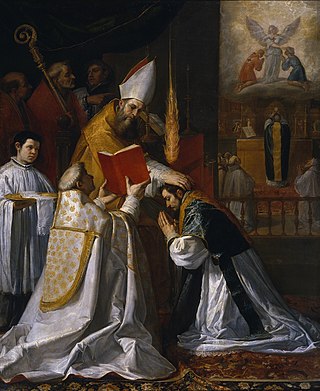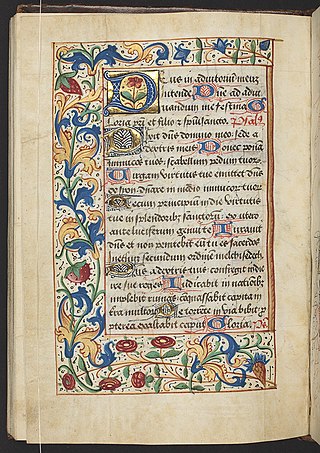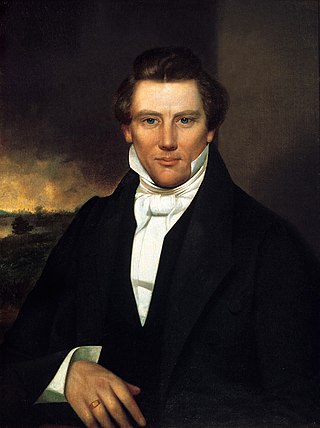Melchizedek is a Biblical figure of significance in both Judaic and Christian traditions.
Contents
Melchizedek may also refer to:
Melchizedek is a Biblical figure of significance in both Judaic and Christian traditions.
Melchizedek may also refer to:

In certain Christian denominations, holy orders are the ordained ministries of bishop, priest (presbyter), and deacon, and the sacrament or rite by which candidates are ordained to those orders. Churches recognizing these orders include the Catholic Church, the Eastern Orthodox, Oriental Orthodox, Anglican, Assyrian, Old Catholic, Independent Catholic and some Lutheran churches. Except for Lutherans and some Anglicans, these churches regard ordination as a sacrament.
In Mormonism, the Melchizedek priesthood, also referred to as the high priesthood of the holy order of God or the Holy Priesthood, after the Order of the Son of God, is the greater of the two orders of priesthood, the other being the Aaronic priesthood.

Ordination is the process by which individuals are consecrated, that is, set apart and elevated from the laity class to the clergy, who are thus then authorized to perform various religious rites and ceremonies. The process and ceremonies of ordination vary by religion and denomination. One who is in preparation for, or who is undergoing the process of ordination is sometimes called an ordinand. The liturgy used at an ordination is sometimes referred to as an ordination.
An elder is someone with a degree of seniority or authority.
In the Latter Day Saint movement, priesthood is the power and authority of God given to man, including the authority to perform ordinances and to act as a leader in the church. A group of priesthood holders is referred to as a quorum.

The Aaronic priesthood is the lesser of the two orders of priesthood recognized in the Latter Day Saint movement. The others are the Melchizedek priesthood and the rarely recognized Patriarchal priesthood. Unlike the Melchizedek priesthood, which is modeled after the authority of Jesus and the Twelve Apostles, or the Patriarchal priesthood, which is modeled after the authority of Abraham, the Aaronic priesthood is modeled after the priesthood of Aaron the Levite, the first high priest of the Hebrews, and his descendants. The Aaronic priesthood is thought to be a lesser or preparatory priesthood and an "appendage" of the more powerful Melchizedek priesthood.
The patriarchal priesthood is associated with the patriarchal order found in Mormonism and is especially connected with celestial marriage.
In the Latter Day Saint movement, a bishop is the highest office of the Aaronic priesthood. It is almost always held by one who holds the office of high priest in the Melchizedek priesthood. The Latter Day Saint concept of the office differs significantly from the role of bishops in other Christian denominations, being in some respects more analogous to a pastor or parish priest. Each bishop serves with two counselors, who together form a bishopric.
Elder is a priesthood office in the Melchizedek priesthood of denominations within the Latter Day Saint movement, including the Church of Jesus Christ of Latter-day Saints.
In most denominations of the Latter Day Saint movement, a high priest is an office of the priesthood within the Melchizedek priesthood. High priests are typically more experienced leaders within the priesthood. The term derives in part from the Epistle to the Hebrews, which describes Jesus as "a high priest after the order of Melchizedek". Movement founder Joseph Smith ordained the first high priests on June 3, 1831.

In the Latter Day Saint movement, confirmation, is an ordinance essential for salvation. It involves the laying on of hands and is performed after baptism. Through confirmation, the initiate becomes an official member of the church and receives the gift of the Holy Ghost. Baptism and confirmation are administered to persons at least eight years old. The ordinance corresponds to the confirmation rite in many other Christian faiths. Confirmations were first performed on April 6, 1830, at the organizational meeting of the Church of Christ.

The priesthood of Melchizedek is a role in Abrahamic religions, modelled on Melchizedek, combining the dual position of king and priest.
The naming and blessing of a child in the Church of Jesus Christ of Latter-day Saints is a non-saving ordinance, usually performed during sacrament meeting soon after a child's birth in fulfillment of the commandment in the Doctrine and Covenants: "Every member of the church of Christ having children is to bring them unto the elders before the church, who are to lay their hands upon them in the name of Jesus Christ, and bless them in his name." The purpose of the practice is twofold: to give a baby an official name and to provide an opportunity to give a blessing for the child's spiritual and physical welfare. This practice is usually only performed for infants, though older children may also receive the blessing; adult or teenaged converts to the church do not receive a comparable ordinance.

In the Bible, Melchizedek, also transliterated Melchisedech or Malki Tzedek, was the king of Salem and priest of El Elyon. He is first mentioned in Genesis 14:18–20, where he brings out bread and wine and then blesses Abram and El Elyon.
In the Church of Jesus Christ of Latter-day Saints, the priesthood is the power and authority to act in the name of God for the salvation of humankind. Male members of the church who meet standards of worthy behavior and church participation are generally ordained to specific offices within the priesthood.
Symphonia is a normative theory or concept in Eastern Orthodox Christian theological and political thought, especially within the Eastern Roman and Russian Empires, which posits that church and state are to complement each other, exhibiting mutual respect with neither institution presuming to dominate the other.

Psalm 110 is the 110th psalm of the Book of Psalms, beginning in English in the King James Version: "The LORD said unto my Lord". In the slightly different numbering system used in the Greek Septuagint and Latin Vulgate translations of the Bible, this psalm is Psalm 109. In Latin, it is known as Dixit Dominus. It is considered both a royal psalm and a messianic psalm. C. S. Rodd associates it with the king's coronation.
70 may refer to:
In rabbinic Jewish eschatology, the Righteous Priest or Priest of Righteousness is a figure identified with one of the Four Craftsmen in a vision mentioned in the Book of Zechariah. He is found in the Talmud and Midrash.

The following outline is provided as an overview of and topical guide to the life and influence of Joseph Smith: